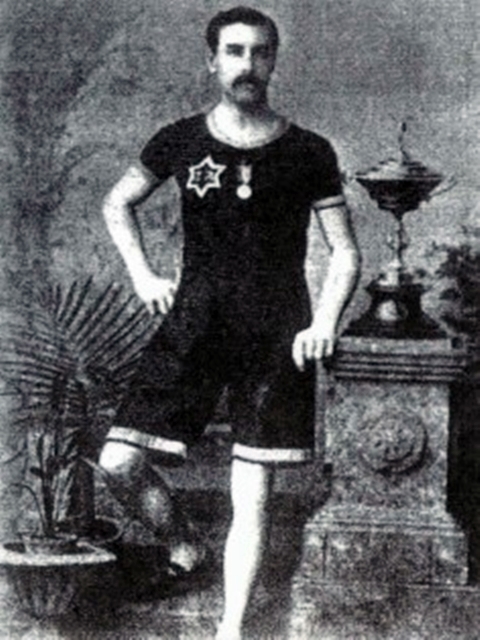
| Roles | Competed in Olympic Games |
|---|---|
| Sex | Male |
| Full name | Charles•Bennett |
| Used name | Charles•Bennett |
| Born | 9 December 1871 in Burley, England (GBR) |
| Died | 18 December 1948 (aged 77 years 9 days) in Kinson, England (GBR) |
| Affiliations | Portsmouth Harriers, Portsmouth (GBR) |
| NOC |  Great Britain Great Britain |
| Medals | OG |
| Gold | 2 |
| Silver | 1 |
| Bronze | 0 |
| Total | 3 |
Charles Bennett of Finchley Harriers won the AAA 4 mile title in 1897 and in 1899 he was the National cross-country champion and won both the AAA 4 miles and 10 miles on the track. Early in 1900 he retained his cross country crown, but by the summer he had developed a certain measure of speed and defeated a rather undistinguished field to take the AAA mile title. His winning time of 4:28.2 seconds did not augur well for his Olympic chances but 1900 was not a vintage year for milers and the best time recorded in the world that year was a modest 4:24.4 seconds by the American John Cregan. Cregan withdrew from the 1,500 metres at the Paris Olympics on sabbatical grounds and Bennett’s main challenger was Henry Deloge, the local idol and the world record holder at 1,000 metres. There were no heats for the 1,500 metres and after a close race Bennett beat Deloge by two metres in 4:06.2 seconds. This was said at the time to be a world record, although clearly many athletes had passed the 1,500 metres mark in a faster time during the course of a mile race. Nevertheless Bennett achieved the distinction of being the first British athlete to win an Olympic track and field event.
Bennett won a second gold medal and set a second world record seven days later when he led Britain to victory in the 5000 metres team race and he had, in the interim, won a silver medal in the longer of the two steeplechase events. Despite his two world records and his Olympic titles, Charles Bennett remains a much under-rated athlete, particularly in historical rather than temporal terms. His performance at Paris in July 1900 was possibly the finest double by a British athlete since Fred Elborough achieved the remarkable feat of breaking the world record for both the 220 yards and the 880 yards in one afternoon in October 1876.
Bennett’s Olympic season closed in October with a challenge match against Alfred Tysoe at Belle Vue, Manchester. Tysoe was the AAA and Olympic champion at 880 yards/800 metres and Bennett held identical titles at the mile/1500 metres distance, and a meeting was arranged over three-quarters of a mile, which was mid-way between their championship distances, to decide which of these two fine athletes was Britain’s leading middle-distance runner. Tyson won a close race in 3:13.0 seconds but Bennett’s British record of 3:10.6 seconds survived.
Personal Bests: 1500 – 4:06.2 (1900); Mile – 4:24.2 (1899); 2 miles – 9:35.0 (1898); 5000 – 15:20.0 (1900); 4 miles – 19:48.0 (1899).
| Games | Discipline (Sport) / Event | NOC / Team | Pos | Medal | As | |
|---|---|---|---|---|---|---|
| 1900 Summer Olympics | Athletics |  GBR GBR |
Charles Bennett | |||
| 1,500 metres, Men (Olympic) | 1 | Gold | ||||
| 2,500 metres Steeplechase, Men (Olympic) | ||||||
| 4,000 metres Steeplechase, Men (Olympic) | 2 | Silver | ||||
| 5,000 metres, Team, Men (Olympic) | Amateur Athletic Association | 1 | Gold | |||
| 800 metres, Handicap, Men (Olympic (non-medal)) | AC r2/2 |
Great controversy exists about the vital data of Charles Bennett, the athlete. The problem is that three persons named Charles Bennett were born at approximately the same time in close proximity to one another, in Dorset or Hampshire, England (adjacent counties on the south England coast). For many years it was felt that the Olympic runner was born in Shapwick, Dorset, England on 28 December 1870, and died on 16 December 1950 in Bournemouth, Bournemouth, England. However, this appears to have been one of the “other” Charles Bennetts, not the Olympic runner. There was also a third Charles Bennett, born 8 April 1872 who died 9 March 1949, but there is nothing to connect him to being an Olympic runner. The OlyMADMen have conducted extensive research on the problem and can document all of this with originally sourced data.